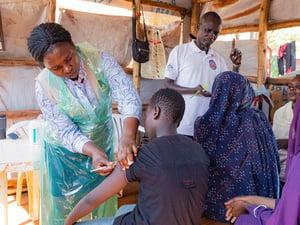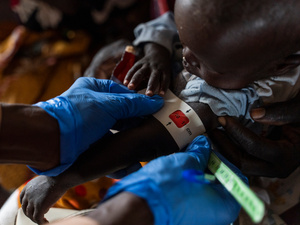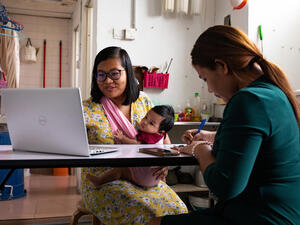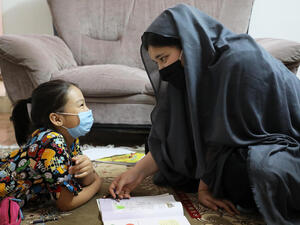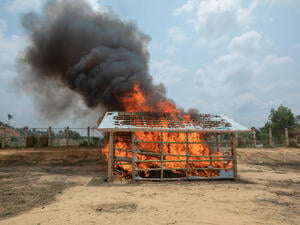A chance to live: The quest of Venezuelan refugees and migrants with HIV/AIDS

A chance to live: The quest of Venezuelan refugees and migrants with HIV/AIDS
Sitting on a crowded bus about to reach Lima, Peru, after seven days on the road and thousands of kilometres away from his home country of Venezuela, Arturo* started to feel terrified. The 47-year-old wondered about getting access to human immunodeficiency virus (HIV) medication: “Will I die in this country where I do not know anyone?”
Over three million refugees and migrants have left Venezuela to date. The lack of medicine has forced thousands – especially those with chronic illnesses such as HIV/AIDS – to search for treatment and hope in other countries.
For people living with HIV/AIDS, having access to antiretroviral treatment means not only a chance to survive, but to lead a normal life. Over 7,700 Venezuelans live with the condition outside of their home country and are in need of antiretroviral therapy, according to UNAIDS.
Arturo was diagnosed in 2000. He had a comfortable, healthy life as a hair and make-up stylist in Caracas, Venezuela until about two years ago, when access to antiretroviral medication was shrinking.
“I was really scared of not having any medication.”
To get the daily pills he needed, he was forced to resort to friends who were doctors. But soon it became even more cumbersome. Arturo felt he only had one option.
“This marked my decision to leave,” he says. “I was really scared of not having any medication.”
Since he left less than six months ago, Arturo says that five of his friends with HIV/AIDS who remained in Venezuela have died.
Countries like Peru and Mexico have recognized some cases of Venezuelans with HIV as refugees. However, there is no regional response in Latin America that guarantees access to antiretroviral medication for Venezuelan refugees and migrants with HIV/AIDS. Their access to treatment depends on each of the countries’ policies, and they vary greatly from one country to another.
UNHCR, the UN Refugee Agency, and UNAIDS are providing technical support to national NGOs working to establish a regional network that will allow people with HIV to safely contact clinics, hospitals, shelters and other organizations providing humanitarian assistance to those searching for treatment outside Venezuela.
“Refugees and migrants from Venezuela living with HIV need access to life-saving antiretroviral treatment and care in host countries as well as consistent access to targeted HIV prevention information, education and communication, voluntary counselling, testing and condoms,” says UNAIDS regional programme adviser Alejandra Corao.

Darwin (right), Venezuelan living with HIV in Peru, next to his partner. Darwin volunteers with AIDS Healthcare Foundation (AHF) in Lima.
Not providing easy access to antiretroviral treatment can develop into a public health issue because it can increase the risk of HIV antiretroviral resistance and the number of new HIV infections, Corao adds.
Refugees and migrants may avoid going to the hospital for fear of being discriminated due to their condition or – if they do not have legal residence – of being deported. That increases the risk of transmission in host countries.
To his surprise, it only took Arturo 20 days to start treatment in Lima. “The medical attention was wonderful,” he says. “I immediately got into treatment. Everyone was very respectful.”
In Peru, access to antiretroviral medication is free. However, availability and effective access are not always guaranteed. UNHCR’s partner organization PROSA reported three cases of Venezuelans with HIV/AIDS they have been monitoring who died because they did not get timely access to retroviral treatment. Civil society actors report eight cases in total.
“As soon as I told them about my condition, they asked me to leave. They said I could infect others.”
In addition, most refugees and migrants do not have access to the public health system – for instance, when it comes to treatment of other conditions developed from HIV.
“We demand universal coverage,” says Julio Rondinel, a Peruvian psychologist who supports Venezuelan refugees and migrants with HIV in his therapy group at CCEFIRO Association. “Consuming antiretroviral medication for long periods of time generates metabolic syndromes, like diabetes or high blood pressure.”
Due to their uniquely vulnerable condition, Venezuelans with HIV/AIDS can apply for extraordinary residency in Peru. To qualify for it, they need to provide a medical exam and go through some health controls, which can amount to some 170 soles (US$50).
“Ensuring broader access to health care is essential for the most vulnerable, like refugees and migrants with HIV/AIDS, whose lives depend on it,” says UNHCR acting Representative in Peru, Sabine Waehning.
Willy’s arrival in Peru was not as positive as Arturo’s. The 22-year-old was diagnosed with HIV in September 2017 in Venezuela, and the doctor was blunt in his recommendation: “If you stay here, you will die.”
After some months in Colombia and Ecuador, Willy made it to Peru’s capital in August. He spent his first 10 days in a shelter. “As soon as I told them about my condition, they asked me to leave,” Willy recalls. “They said I could infect others.”
Thanks to non-profit organizations such as PROSA and AHF, he was able to undergo the necessary medical exams to access treatment. When it comes to antiretroviral therapy in Peru, Willy has only praising words. The medical attention was “top notch” and he quickly started treatment.
"Here you feel safe.”
Willy is now trying to complete his medical tests, so that he can apply for extraordinary residency. “If you don’t have it, it’s very difficult to find a job,” he says.
Darwin, 29, feels like he is now contributing to helping others as a volunteer with AIDS Healthcare Foundation (AHF) in Lima. He advocates for access to treatment and support for both Peruvians and Venezuelans, and accompanies newly arrived Venezuelans with HIV/AIDS to the hospital and supports them in their quest to access antiretroviral treatment.
If he had stayed in Venezuela, Darwin would have died. After three months without medication – because antiretrovirals were impossible to find in hospitals and too expensive to buy in the black market – he got very sick with a stomach virus. He became so weak that he could not walk. He lost 34 kilograms in four months. Darwin said to himself, “I am not going to surrender, I want to keep living.”
Darwin found safety in Peru a year ago. For him, host countries should be more conscious of the fact that anyone can become a refugee: “It’s like HIV. We are all exposed. No one is safe from that risk.”
Arturo recently got his extraordinary residency. He is now taking eight pills a day and works as a hair stylist in Lima. Leaving his home was hard, but he is thankful to Peru. “It is not easy because when you come you’re lacking so many things,” Arturo says. “But here you feel safe.”
* Last names removed for protection reasons.
Additional reporting by Regina de la Portilla in Lima.

